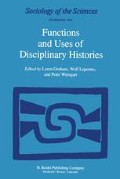Abstract
It is no accident that one of the very oldest disciplines in the humanities is represented in institutes that have such disparate designations as ‘Institute for Classical Philology’, ‘for Humaniora’, “de langues et de Littératures Grecques et Latines”, ‘für Altertumswissenschaft’ (which corresponds to the departments for Ancient Literature and History) and for ‘Literary Science’. It is clear to a philologist that this state merely reflects simultaneously all phases of the history of the discipline since the eighteenth century and there is no lack of investigations in philology on its own history tracing this development. What has not yet been investigated is the question of a possible interdependence between the history of the discipline — especially cultivated in philology — and the development of the discipline itself.
“Classical education — useful education for uselessness becomes useless itself. Where tradition rationalizes itself, it has already ceased.” M. Horkheimer (1950)
Access this chapter
Tax calculation will be finalised at checkout
Purchases are for personal use only
Preview
Unable to display preview. Download preview PDF.
Notes
Ritschl, Friedrich, ‘Über die neuerste Entwicklung der Philologie (1833)’, in ders., Opuscula philologica, Vol. V, Hildesheim: Olms (1978) 1–18 (Repr. of the ed. Leipzig: Teubner, 1879).
Ernesti, Johann, Christian Gottlieb, ‘Lexicon technologiae (1762)’, 2 Vols., Hildesheim: Olms (1962) (Repr. of the ed. Leipzig 1795 and 1797).
Wolf, Friedrich August, ‘Einleitung in die Alterthumswissenschaft (1807)’, in ders., Vorlesungen über die Alterthumswissenschaft, Vol. I, Leipzig: Lehnhold (1839) 1–46.
Boeckh, August, ‘Enzyklopädie und Methodologie der philologischen Wissenschaften (1809–65)’, Leipzig: Teubner (1877).
Cf. Ritschi, op. cit., 13.
Wilamowitz-Moellendorff, Ulrich von, ‘Philologie und Schulreform (1892)’, in ders., Reden und Vorträge, Berlin: Weidmann (1901) 97–119.
Welcker, Friedrich Gottlieb, ‘Über die Bedeutung der Philologie (1841)’, in ders., Kleine Schriften, Vol. IV, Osnabrück: Zeller, (1973) 1–16 (Repr. of the ed. Bonn: Weber, 1861).
Mommsen, Theodor, ‘Akademische Antrittsrede (1858)’, in ders., Reden und Aufsätze, Berlin: Weidmann (1905) 35–38.
Usener, Hermann, ‘Philologie und Geschichtswissenschaft (1882)’, in ders., Vorträge und Aufsätze, Leipzig: Teubner (1907) 1–35.
Jaeger, Werner, ‘Philologie und Historie (1914)’, in ders., Humanistische Reden und Vorträge, Berlin-Leipzig: de Gruyter (1937) 1–17.
Jaeger, Werner, ‘Paideia: die Formung des griechischen Menschen (1933)’, Berlin: de Gruyter (1934–37).
Heinze, Richard, ‘Die gegenwärtigen Aufgaben der römischen Literaturgeschichte’, in Neue Jahrbücher 19 (1907) 161–189.
Reinhardt, Karl, ‘Die Klassische Philologie und das Klassische (1942)’, in ders., Vermächtnis der Antike, Göttingen: Vandenhoeck und Ruprecht (1960) 334–60.
Pfeiffer, Rudolf, ‘Geschichte der klassischen Philologie’, Reinbek bei Hamburg: Rowohlt (1970).
Fuhrmann, Manfred, ‘Die Antike und ihre Vermittler’, Konstanz: Universitätsverlag (1969)
Fuhrmann, Manfred, ‘Wie klassich ist die klassische Antikeü’, Stuttgart: Artemis (1970) 12.
Author information
Authors and Affiliations
Editor information
Editors and Affiliations
Rights and permissions
Copyright information
© 1983 D. Reidel Publishing Company
About this chapter
Cite this chapter
Herzog, R. (1983). On the Relation of Disciplinary Development and Historical Self-Presentation — the Case of Classical Philology Since the end of the Eighteenth Century. In: Graham, L., Lepenies, W., Weingart, P. (eds) Functions and Uses of Disciplinary Histories. Sociology of the Sciences a Yearbook, vol 7. Springer, Dordrecht. https://doi.org/10.1007/978-94-009-7035-9_10
Download citation
DOI: https://doi.org/10.1007/978-94-009-7035-9_10
Publisher Name: Springer, Dordrecht
Print ISBN: 978-90-277-1521-0
Online ISBN: 978-94-009-7035-9
eBook Packages: Springer Book Archive

